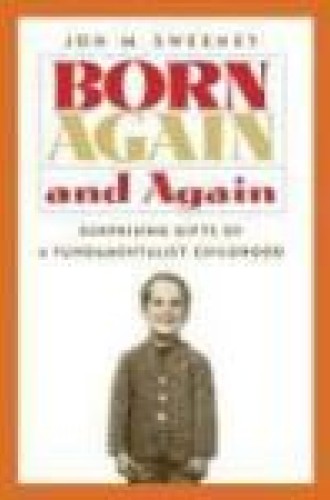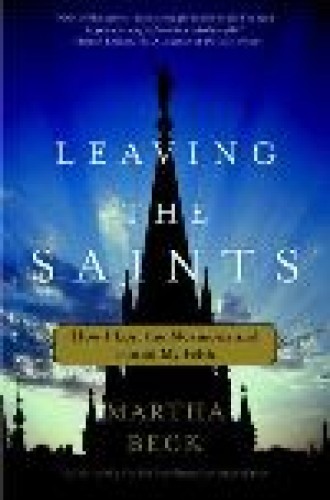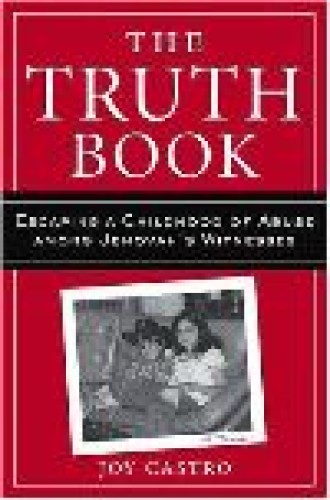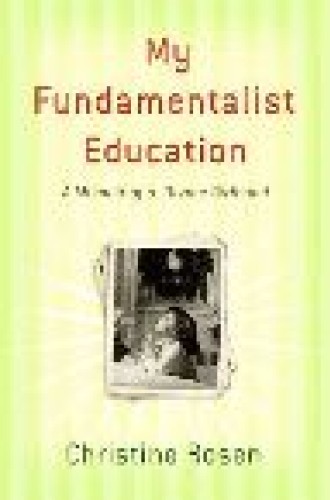BookMarks
When Jon Sweeney was a little boy, he knelt in his living room and asked Jesus into his heart. For his parents, his extended family and his community, that act was meant to define and direct the rest of his life. In his memoir, Born Again and Again: Surprising Gifts of a Fundamentalist Childhood, Sweeney describes the many ways that fundamentalism has defined him even as he has sought his way out of it. He remembers fundamentalism almost sweetly, sometimes with nostalgia and sometimes with humor, though he also casts a critical eye on its failings, which forced him from its fold.
Several recent memoirs tell about leaving a fundamentalist faith. Each writer remembers a time when the world appeared, at least on its surface, to make perfect sense, a time when each embraced religious certainty without question, and a time when that world began to break apart.
The writers of these four books emerged from faiths that were largely formed in 19th-century North America—Christian fundamentalism, Mormonism and the Jehovah’s Witnesses. The faiths are distinct culturally and doctrinally—so distinct that adherents of each faith are quite sure that adherents of the others are going to hell (or technically, for Mormons, to the telestial kingdom). Each faith requires missionary efforts to convert followers of other faiths. If Jon Sweeney, Martha Beck, Christine Rosen and Joy Castro had gotten together for a conversation early in their lives, they might have thought it their duty to inform each other of the consequences of their beliefs. Oddly enough, this is what binds these homegrown American religions together: certainty and fear of not following the rules.
To find a way out of fundamentalism, each writer had to contend with the consequences of breaking the community’s rules. Exile, confusion and a gradual, painful articulation of their own stories in the face of accepted religious truth were the results of their struggle with fundamentalism.
In Born Again and Again, Sweeney places himself in a long tradition of fundamentalist preachers. He was raised in Wheaton, Illinois, and both of his grandfathers were independent Baptist preachers. His family’s expectation was that he too would be a great leader—perhaps a preacher or a missionary. Sweeney remembers his passionate early embrace of this idea and his desire to fulfill his family’s expectations.
The love, pride and unadulterated certainty of his family bound him to his fundamentalist faith in a way that perhaps was unique among the experiences of these four writers. He describes his tiny grandmother giving him a hug and telling him, “God loves you and so do I!” She squeezed him so hard that it was as if she wanted to physically press the love of God into him so he would never forget it. He writes that the “sensuous” aspects of his faith—the familiar fundamentalist hymns, the voices of small-town preachers crackling through his AM radio, the “thunderous, rhythmic word pounding the Spirit of God”—bound him, far more than dogma did, “like a slip knot, loosely but decisively to my religious place.”
Although Sweeney is unique in describing the tactile bonds that tied him to fundamentalism, each writer experienced certainty and embraced the absolute doctrines of the faith with either childlike enthusiasm or a careful adult decision. Although she was thoroughly enveloped in Mormon culture, Beck does not remember being fully convinced of Mormon doctrine as a child. She remembers sitting in the pew, flipping through the hymnal and adding “in the bathtub” to each song title: “I Stand All Amazed in the Bathtub”; “I Know that My Redeemer Lives in the Bathtub”; “Behold a Royal Army in the Bathtub.” As an adult, however, she moved back to her hometown of Provo, Utah, and embraced her Mormon heritage as fully as she could. In her struggle to be the perfect Mormon wife, she tried to fulfill every expectation placed on her, from baking bread to attending the Relief Society. She made a conscious decision to accept the religious faith of her family in order to gain an authentic spiritual life.
All of these memoirists tried, like Beck, to practice what they had been taught, attempting to make the religion their own. This earnestness creates some comic moments. In My Fundamentalist Education, Rosen remembers that her fundamentalist school urged her to share her faith with others. She innocently attempted to convert her neighbors, two Catholic girls, as they played with Barbies and argued about whether Ken and Skipper could sleep in the same bed. As a first-year student at Moody Bible Institute in Chicago, Sweeney took a class called Evangelism 101, and he tried to practice what the instructors preached. He went out into the streets to speak the truth of his faith to as many people as possible.
I witnessed to everybody, it seemed, and couldn’t save a single soul. From the drunks at night on Rush Street: “Watch you talkin’ bout? I luhhv Jee-sus!” to the manager at Mr. G’s, the hamburger joint parodied by John Belushi and Dan Ackroyd on Saturday Night Live: “Never mind! Keep moving! Next!” I witnessed on the train, on the bus, on the street and in a cab. I was like a character in a Dr. Seuss story: Will you witness on the train? Will you witness on the bus? Will you witness on the street? You must, you must!
Rosen’s and Sweeney’s stories share this lighthearted poking fun at their early selves and the sense that the religion pressed on them was endearing. Castro’s and Beck’s stories, on the other hand, are marked by episodes of abuse and long periods of darkness.
In The Truth Book, Castro tells of how she spent her early childhood trying to do everything right. Born to a Jehovah’s Witnesses family, she went door to door handing out tracts, spent her Sundays at the Kingdom Hall and believed without a shadow of a doubt that those outside of the kingdom were damned. Castro’s mother, who was also trying to do things right, married a man in the church who was much admired by others. He had served at the Watchtower headquarters in Brooklyn, he was devout, and on the surface he was a good Jehovah’s Witness. But not long into the marriage, this man’s abuse of Castro, her younger brother and their mother intensified. Castro’s story is dominated by this abuse to the extent that it darkens nearly everything she says about the Jehovah’s Witnesses and her early faith.
For all of the authors a time came when they tested their own experience against their religion’s claims. Gradually they realized that fundamentalist religion had failed them. It could not speak to or explain their experiences. It could not answer their questions. This moment was perhaps most distinct for Castro. She was 14 and had been living with her abusive stepfather for two years. She had been completely encapsulated by the ideology of those around her, and she had cut off communication with her biological father because he smoked and was no longer a Jehovah’s Witness. Her mother and stepfather made it clear that the father was evil. Meanwhile, the stepfather was beating Joy, her mother and her brother and laying down bizarre and intricate rules for the family. If they were eating peanut butter and jelly sandwiches, for example, he insisted that he get two, the mother one, Joy half and Joy’s brother one quarter. The abuse was intense and ongoing, and Castro describes it in harrowing detail.
One day a girl at school who had gradually befriended Castro and whom Castro had very slowly and carefully told of the abuse said, “Get out of there.” When Castro told her she had nowhere to go, the girl asked about her biological father.
“No. . . . He’s disfellowshipped.”
“Dis-whatted?” the girl asked.
“It’s like being excommunicated. He sinned and wasn’t repentant. We have to shun him.”
“What did he do?”
“He smokes cigarettes.”
The girl indignantly and vulgarly expressed her disgust. “What kind of a god gives more of a sh-- about smoking than somebody who whales on little kids?” Castro had never put it to herself this way.
“Look,” the girl said, “If you ever want help getting out of that f---hole, let me know.” After that conversation Castro began trying to reunite with her father. It was the beginning of her distance from the Jehovah’s Witnesses as well, but for a long time she was able to follow her courageous path out of abuse only by convincing herself that her biological father would still let her attend Kingdom Hall services.
For most of the memoirists, a period of cognitive dissonance followed the realization that they could not bring together their experience with the religious tenets they had been taught. For Sweeney, crucial moments of understanding came while he was serving as a missionary in the Philippines and began to see missionary work from the standpoint of the missionized. He saw how arrogant and naive his own assumptions were and how subtly and graciously he and his fellow missionaries were rejected. This only deepened the questions growing in his own mind, questions about a multitude of claims he had always accepted about the Bible, history and the future.
Cognitive dissonance gradually gave way to tangible forms of leaving, and leaving turned, at times, into exile. Beck discovered that the warmth of her neighbors and the people in her ward dissolved when she and her husband officially resigned from the Latter-day Saints church. Friends and family alike shunned her. Sweeney’s childhood friends had little to say to him, and his actions led to difficult, although still loving, questions from his family. Castro was completely cut off from her mother’s life, and the reader questions whether reconciliation is possible amidst so much pain. The cost of leaving is high for all except perhaps Rosen, for whom fundamentalism was never deeply integrated into family life.
The consequences of leaving provoke some of the most thoughtful passages in the books. Sweeney writes that if he were to repent of his waywardness and return to the fundamentalist fold, he knows he would be welcomed with open arms. He poignantly writes, “I would be received like a convert from Judaism or Islam to Christianity, one who saw the errors of his ways. I could probably become a star on the prophecy preaching tours. My testimony would inspire all who listened. I can imagine exactly how that would feel, and I like that feeling.”
Beck knows that the price she has paid for telling her truth about her life is very high. She lives in almost complete exile from her family and home. “I am the one,” she acknowledges, “who broke the family code.” But giving up the certainties of her Mormon upbringing has offered her another certainty on which she now builds her life. “Once you are sure that God is waiting in the acceptance of every true thing, even pain, I’m not sure despair is even possible.”
Castro reaches out through the pain of her childhood to try to understand what drew her parents to the Jehovah’s Witnesses and why her mother remains in the faith.
Both my parents mistrusted and abstained from politics, joining instead—my father briefly, my mother for life—a religion that recognized all people as equals, that had seen the world that way even in the 1920s and ’30s, when most of America hadn’t: the kitschy well-meaning illustrations on the endpapers of the Watchtower books from the Jazz Age and the Depression: a Mexican family all in sombreros, an African family in embroidered A-line robes, a clean-cut white family, a Chinese family in their conical straw hats, all the families standing together, their faces raised toward heaven, where a pale, bearded Jesus rides down on a horse.
She sees in the Jehovah’s Witnesses an attempt to embrace American diversity. This is her most generous gesture toward the religion she perceives as having caused her so much pain.
Sweeney and Beck both have daughters who are being raised without the fundamentalism that rooted them as children. Both express anxiety and joy over their children’s hostility to “fundamentalism of any stripe.” Sweeney’s daughter now follows in the Protestant and fundamentalist tradition of protest by protesting nearly all things religious, from confession of sin to the Eucharist. Sweeney, more than any of the others, wonders if he can anchor his children without the faith that so moored him.
Each of these memoirs of fundamentalism has something to recommend it. The weakest of the four is Rosen’s My Fundamentalist Education. Though readers who are familiar with fundamentalist culture of the 1970s and ’80s will appreciate her descriptions of the impact that evangelist Joni Eareckson and traveling missionaries had on her as a small girl, and of her growing passion for the Bible and of her puzzlement over the relationship between creation and evolution, her story rarely penetrates the surface of that culture. Sweeney traces the same ground as Rosen, having grown up at nearly exactly the same historical moment, but he confronts the realities of a fundamentalist background with more depth and gives us a careful examination of his own soul. At moments Sweeney seems to be trying too hard to be gentle with his heritage, but he offers a memorable look at the way fundamentalism—for good and for ill—shapes a life long after its tenets have been left behind.
Comparing the stories of Sweeney and Rosen to those of Castro and Beck is a little like comparing the faiths out of which they come. There are certainly similarities, but the stark differences compel greater attention. Castro’s and Beck’s memoirs are extraordinarily well written, and both are page-turners. I read The Truth Book almost in one sitting, waiting desperately for Castro’s decision to run away from her abusive family. Though her bitterness perhaps prevents her from providing the reader with balanced insight into the Jehovah’s Witnesses, the story maintains its grip on the reader with each heart-crushing turn.
Beck is a master of the memoir. Like her first book, Expecting Adam, Leaving the Saints requires the reader to suspend attention to the outside world and enter completely into the author’s reality. She compels belief in the unbelievable, and she knows that thousands of people have reason to deny her version of the truth—about the abuse that she claims is part of her experience and the ugliness revealed by the light she shines on her Mormon upbringing. At the same time, she is eager to praise what she can praise in Mormonism and not to leave the reader with a sense of bitterness. Her subtitle is How I Lost the Mormons and Found My Faith, and faith is what she wants readers to find for themselves.
In leaving certainty, these authors began what felt like an uncharted course in a realm where religious experience is less structured, more open and more frightening than it was in the cocoons of their religious cultures. This leave-taking and reorienting is a common path, one followed by many who are drawn to fundamentalism at certain moments in their lives. These books provide an opportunity to explore that common story, to accept the gifts of fundamentalism along with its flaws and to revisit how religious meaning is made.









